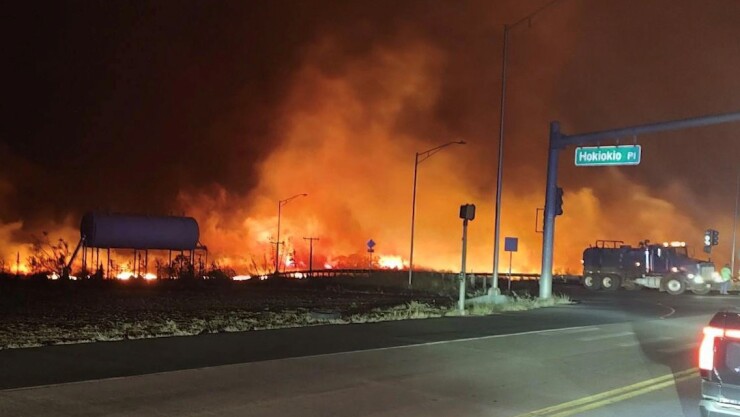
In 31 years as a credit union executive in Maui, Gary Fukuroku says he has never seen this kind of destruction.
"People in the community out there just had to leave with basically the clothes on their back, so I'm sure that there's gonna be a real need. … I grew up in the area, and to see the devastation is just so depressing," said Fukuroku, president and chief executive of the $407 million-asset Maui County Federal Credit Union in Wailuku, Hawaii.
The local credit union veteran quickly established a disaster relief fund for monetary donations and designated the credit union's Wailuku and Kahului branches as collection points for clothing and other necessities. The credit union is also allowing members to defer loan payments for up to one year while offering discounted personal loans up to $50,000.
"As soon as our roads open up, we're trying to go out there and assess the situation, take a look at our branch [in Lahaina] and see how we can provide services to the community out there," Fukuroku said.
Fukuroku is not alone. As wildfires continue to rage throughout the Hawaiian island of Maui, local and national credit unions and community banks are providing financial and physical relief.
Most recently, the
Organizations such as First Hawaiian Bank on Honolulu do not know the status of branches located in ravaged areas amid the current lockdown on Maui, according to a statement from the $24.9 billion-asset bank. Leaders are currently working with local management to ensure staff members are supported.
The Honolulu-based American Savings Bank closed its offices in Lahaina until further notice, but has kept all other locations on the island open. The $9.6 billion-asset bank quickly pledged
The money gathered will be donated to the Hawaii Community Foundation's
Statewide organizations such as the Hawaii Credit Union League are still assessing damages, working to quickly disburse $10,000 in aid to the $145 million-asset Valley Isle Community Federal Credit Union in Kahului, Hawaii, which will oversee distribution of the funds.
Community-based financial institutions like
Other fundraising efforts include the
The NCUF is currently working with the HCUL to identify the institutions most affected by the wildfires. It is preparing for an influx of grant requests as the true scope of the damage becomes clearer, explained Gigi Hyland, executive director of the NCUF.
"When credit unions cooperate with one another, there is no sense of 'that's not in my backyard, therefore I'm not going to help.' … It's the exact opposite reaction," Hyland said.
Credit union leaders with close ties to the impacted communities are activating emergency aid programs as well as gathering basic necessities like clothing and nonperishable food items to provide members with vital funding for recovery.
Executives of other Hawaiian credit unions beyond Maui are organizing initiatives for providing assistance to displaced community members.
Monica Belz, president and CEO of the $143 million-asset Kaua'i Federal Credit Union in Lihue, Hawaii, is working with local municipalities and other nonprofit organizations across her island to coordinate drop-off locations for goods to fill shipping containers with crowdsourced supplies to send to Maui.
"We have a lot of staff and members who have family [on Maui] that've lost their homes, and they're a wreck and a mess right now," Belz said. "It's just heartbreaking."
Local government officials and emergency first responders are still working to control the fires and restore other services such as communications and water.
The wildfires became spread out while crews were battling multiple blazes across the region late Tuesday, when winds as high as
"It's really too early to tell, but what I'm hoping is that we can sit down with some of the developers in the community and figure out what is a good recovery plan for the town of Lahaina," said Andrew Rosen, president and CEO of the $2.4 billion-asset
Even with emergency shelters and
Lahaina bears cultural and historical significance as the original capital of the Hawaiian Kingdom under the rule of King Kamehameha I until the mid-19th century, when it was moved to Honolulu. During that time, it also became a global trading hub for the whaling industry.
"These past few days, the resolve of our families, businesses and visitors has been tested like never before in our lifetimes. … With lives lost and properties decimated, we are grieving with each other during this inconsolable time," Richard Bissen, mayor of Maui County, said in a recorded statement.
John Reosti contributed reporting to this story.






